Nurses Narratives Staff Nurse Estille Marjorie Armstrong
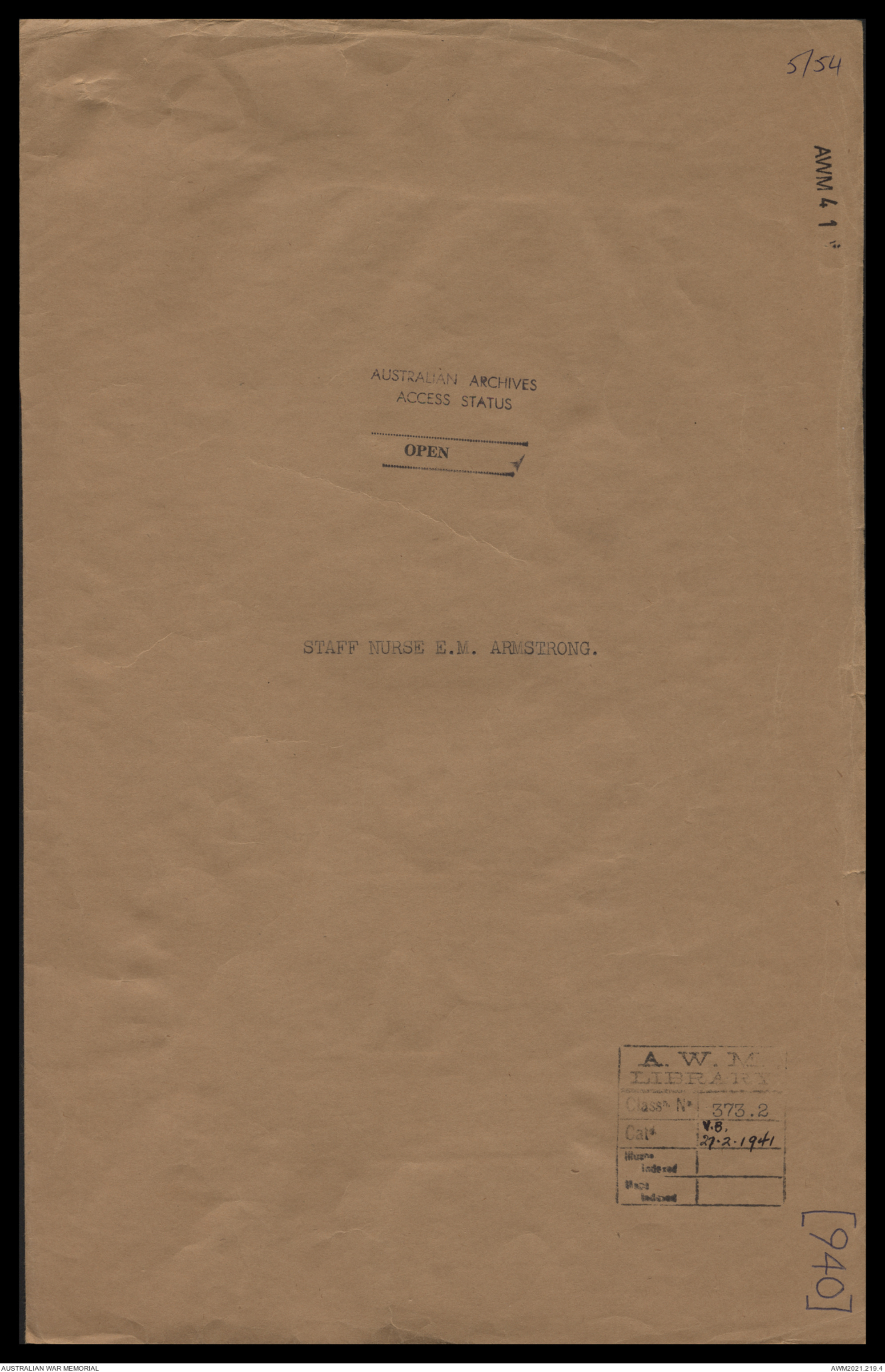
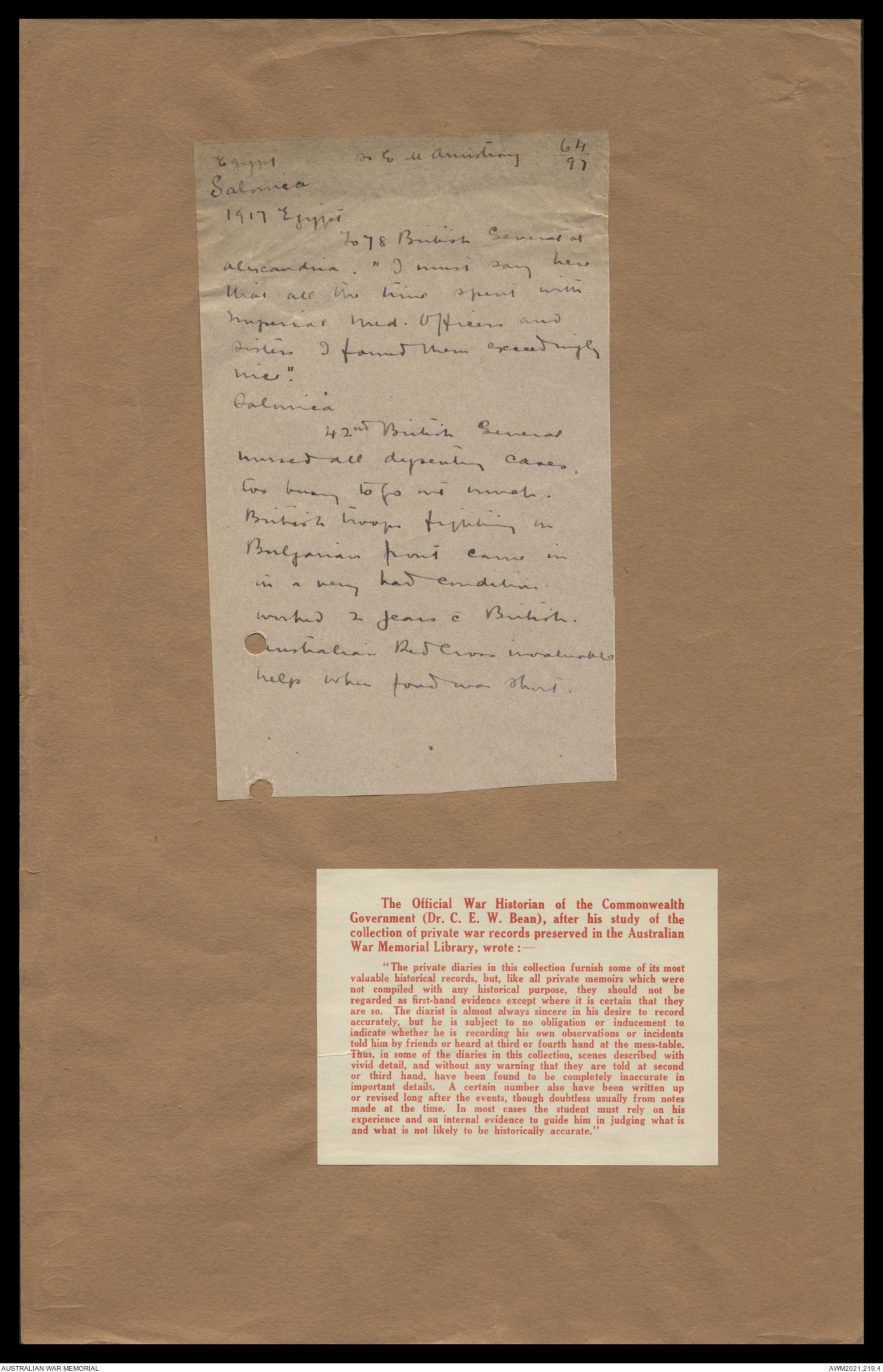
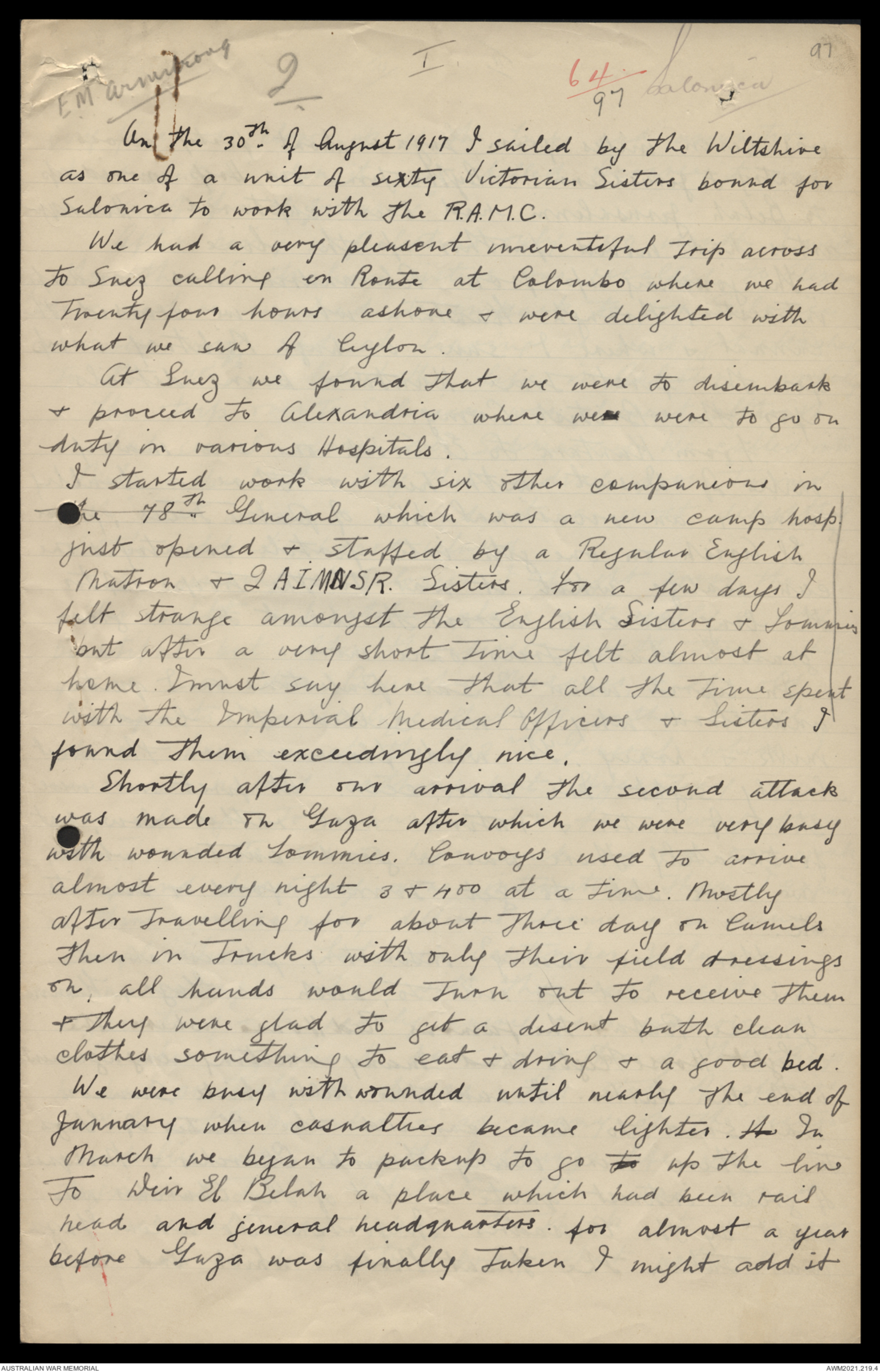
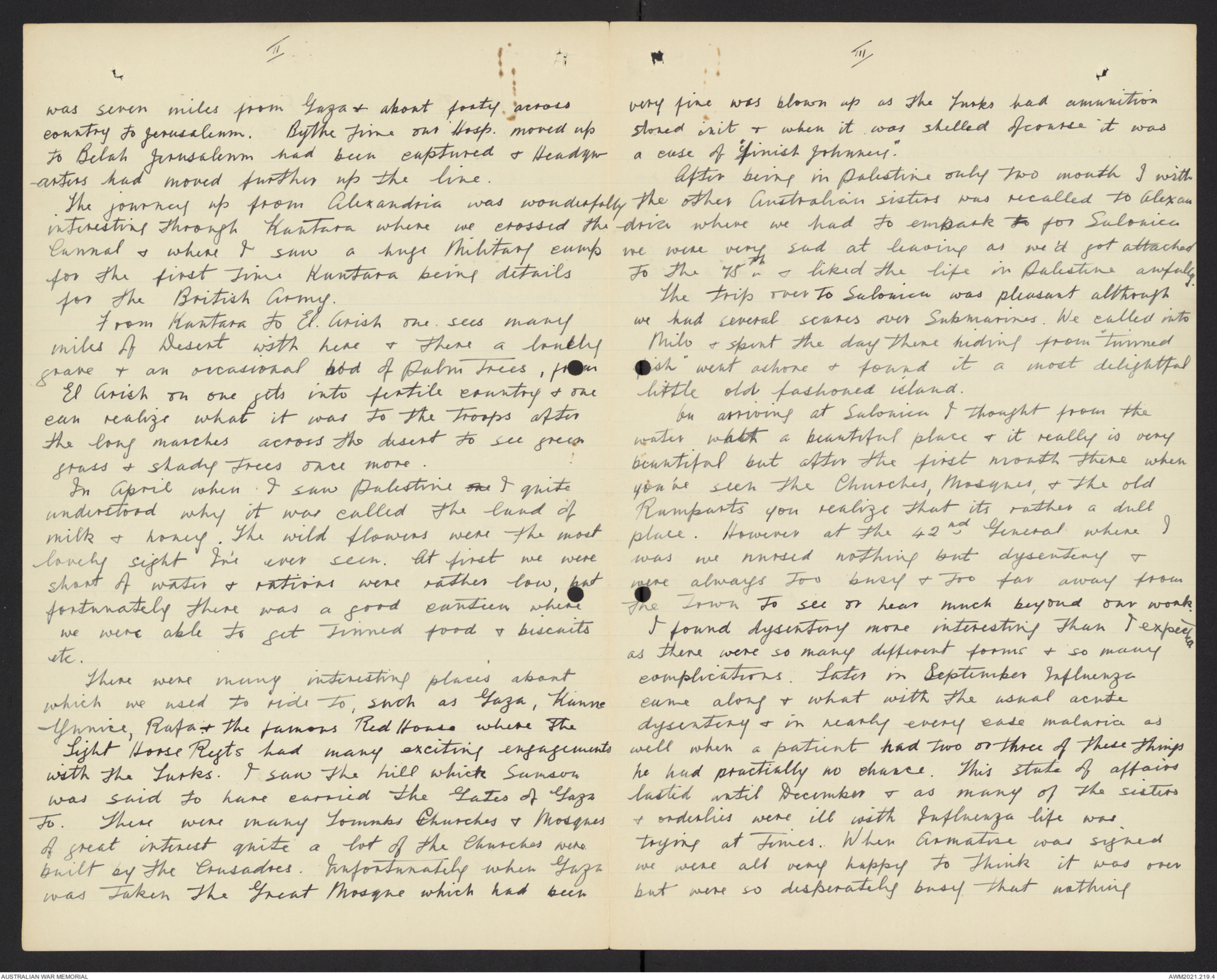
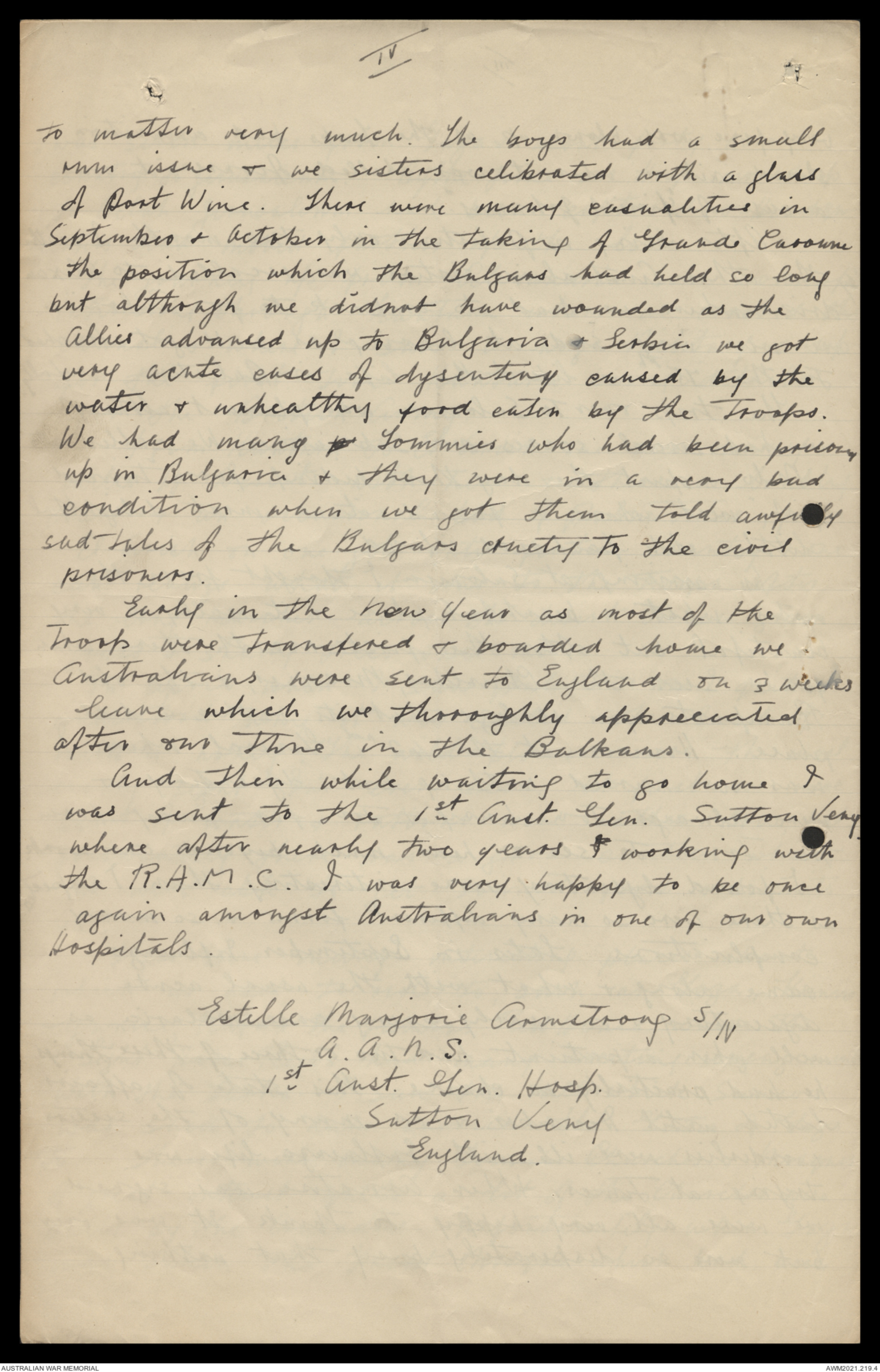
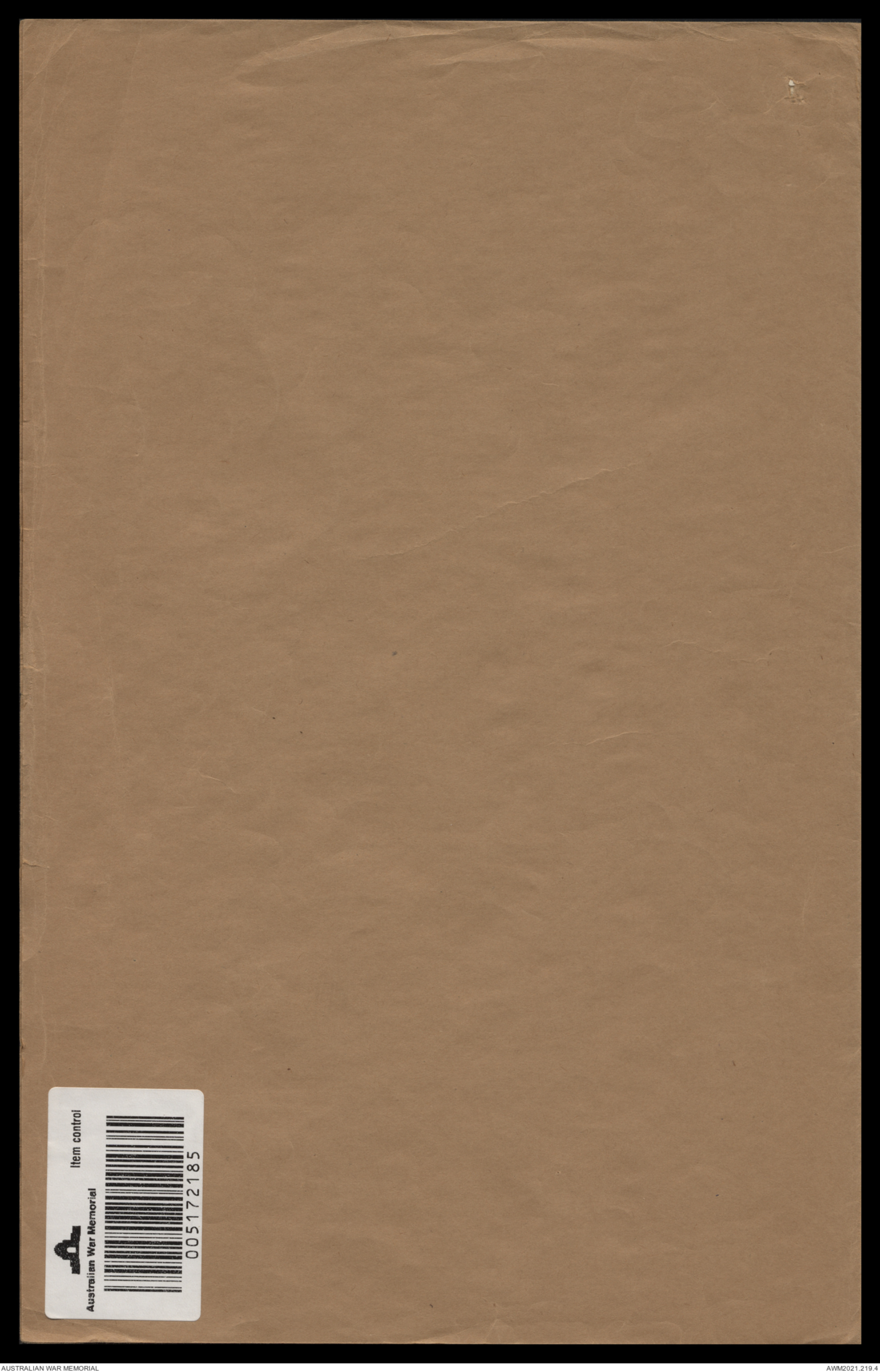
5/54
AWM 41
Australian Archives
Access Status
OPEN
STAFF NURSE E.M. ARMSTRONG.
A.W.M.
LIBRARY
Class No 373.2
Cat V.B. 27.2.1941
[940]
Egypt
Salonica
N E. M. Armstrong
64
97
1917 Egypt
To 78 British Seven at
Alexandria. "I must say here
that all the time spent with
Imperial Med. Officers and
sisters I found them exceedingly
nice."
Salonica
42nd British General
missed all dysentery cases
too busy to go [?on] much.
British troops fighting in
Bulgarian front came in
in a very bad condition
worked 2 years c̅ (=with) British.
Australian Red Cross invaluable
help when food was short.
The Official War Historian of the Commonwealth
Government (Dr. C. E. W. Bean), after his study of the
collection of private war records preserved in the Australian
War Memorial Library, wrote:—
"The private diaries in this collection furnish some of its most
valuable historical records, but, like all private memoirs which were
not compiled with any historical purpose, they should not be
regarded as first-hand evidence except where it is certain that they
are so. The diarist is almost always sincere in his desire to record
accurately, but he is subject to no obligation or inducement to
indicate whether he is recording his own observations or incidents
told him by friends or heard at third or fourth hand at the mess-table.
Thus, in some of the diaries in this collection, scenes described with
vivid detail, and without any warning that they are told at second
or third hand, have been found to be completely inaccurate in
important details. A certain number also have been written up
or revised long after the events, though doubtless usually from notes
made at the time. In most cases the student must rely on his
experience and on internal evidence to guide him in judging what is
and what is not likely to be historically accurate."
E. M. Armstrong
2/
64/97
Salonica
On the 30th of August 1917 I sailed by the Wiltshire
as one of a unit of sixty Victorian Sisters bound for
Salonica to work with the R.A.M.C.
We had a very pleasant uneventful trip across
to Suez calling en Route at Colombo where we had
twenty four hours ashore & were delighted with
what we saw of Ceylon.
At Suez we found that we were to disembark
& proceed to Alexandria where we were to go on
duty in various Hospitals.
I started work with six other companions in
the 78th General which was a new camp hosp.
just opened & staffed by a Regular English
Matron & 2 AIMNSR. Sisters. For a few days I
felt strange amongst the English Sisters & Tommies
but after a very short time felt almost at
home. I must say here that all the time spent
with the Imperial Medical Officers & Sisters I
found them exceedingly nice.
Shortly after our arrival the second attack
was made in Gaza after which we were very busy
with wounded Tommies. Convoys used to arrive
almost every night 3 & 400 at a time. Mostly
after travelling for about three day on Camels
Then in Trucks with only their field dressings
on, all hands would turn out to receive them
& they were glad to get a desent bath clean
clothes something to eat + drink + a good bed.
We were busy with wounded until nearly the end of
January when casualties became lighter. In
March we began to packup to go to up the line
to Deir El Belah a place which had been rail
head and general headquarters. for almost a year
before Gaza was finally taken I might add it
II
was seven miles from Gaza & about forty across
country to Jerusalem. By the time our Hosp. moved up
to Belah Jerusalem had been captured & Headqu
arters had moved further up the line.
The journey up from Alexandria was wonderfully
interesting through Kantara where we crossed the
Cannal & where I saw a huge Military camp
for the first time Kantara being details
for the British Army.
From Kantara to El. Arish one sees many
miles of Desert with here + there a lonely
grave & an occasional bod of Palm Trees, from
El Arish on one gets into fertile country + one
can realize what it was to the troops after
the long marches across the desert to see green
grass & shady trees once more.
In April when I saw Palestine one I quite
understood why it was called the land of
milk & honey. The wild flowers were the most
lovely sight I've ever seen. At first we were
short of water & rations were rather low, but
fortunately there was a good canteen where
we were able to get tinned food & biscuits
etc.
There were many interesting places about
which we used to ride to, such as Gaza, Kanne
[[Gunice?]], Rafa & the famous Red House where the
Light Horse Regts had many exciting engagements
with the Turks. I saw the hill which Samson
was said to have carried the Gates of Gaza
to. These were many tombs Churches & Mosques.
of great interest quite a lot of the Churches were
built by the Crusadres. Unfortunately when Gaza
was taken The Great Mosque which had been
III
very fine was blown up as the Turks had ammunition
stored in it & when it was shelled of course it was
a case of "finish Johnney."
After being in Palestine only two month I with
the other Australian sisters was recalled to Alexandria
where we had to embark to for Salonica
we were very sad at leaving as we'd got attached
to the 78th & liked the life in Palestine awfully.
The trip over to Salonica was pleasant although
we had several scares over Submarines. We called into
Milo & spent the day there hiding from "[[trinned?]]
fish" went ashore & found it a most delightful
little old fashioned island.
On arriving in Salonica I thought from the
water what a beautiful place & it really is very
beautiful but after the first month there when
you've seen the Churches, Mosques & the old
Ramparts you realize that its rather a dull
place. However at the 42nd General where I
was we nursed nothing but dysentery &
were always too busy & too far away from
the town to see or hear much beyond our work.
I found dysentery more interesting than I expected
as there were so many different forms & so many
complications. Later in September Influenza
came along & what with the usual acute
dysentery & in nearly every case malaria as
well when a patient had two or three of these things
he had practically no chance. This state of affairs
lasted until December & as many of the sisters
& orderlies were ill with Influenza life was
trying at times. When Armastise was signed
we were all very happy to think it was over
but were so desperately busy that nothing
IV
to matter very much. The boys had a small
rum issue & we sisters celebrated with a glass
of Port Wine. There were many causalities in
September & October in the taking of Grand Carowne
The position which the Bulgars had held so long
but although we didnot have wounded as the
allies advanced up to Bulgaria & Serbia we got
very acute cases of dysentery caused by the
water & unhealthy food eaten by the Troops.
We had many Tommies who had been prisoners
up in Bulgaria & they were in a very bad
condition when we got them told awfully
sad tales of the Bulgars cruelty to the civil
prisoners.
Early in the new year as most of the
troop were transfered & boarded home we
Australians were sent to England on 3 weeks
leave which we thoroughly appreciated
after our time in the Balkans.
And then while waiting to go home I
was sent to the 1st Aust. Gen. Sutton Veny
where after nearly two years & working with
the R.A.M.C. I was very happy to be once
again amongst Australians in one of our own
Hospitals.
Estelle Marjorie Armstrong S/N
A.A.N.S.
1st Aust. Gen. Hosp.
Sutton Veny
England.
Item control
Australian War Memorial
005172185
 Jacqueline Kennedy
Jacqueline KennedyThis transcription item is now locked to you for editing. To release the lock either Save your changes or Cancel.
This lock will be automatically released after 60 minutes of inactivity.